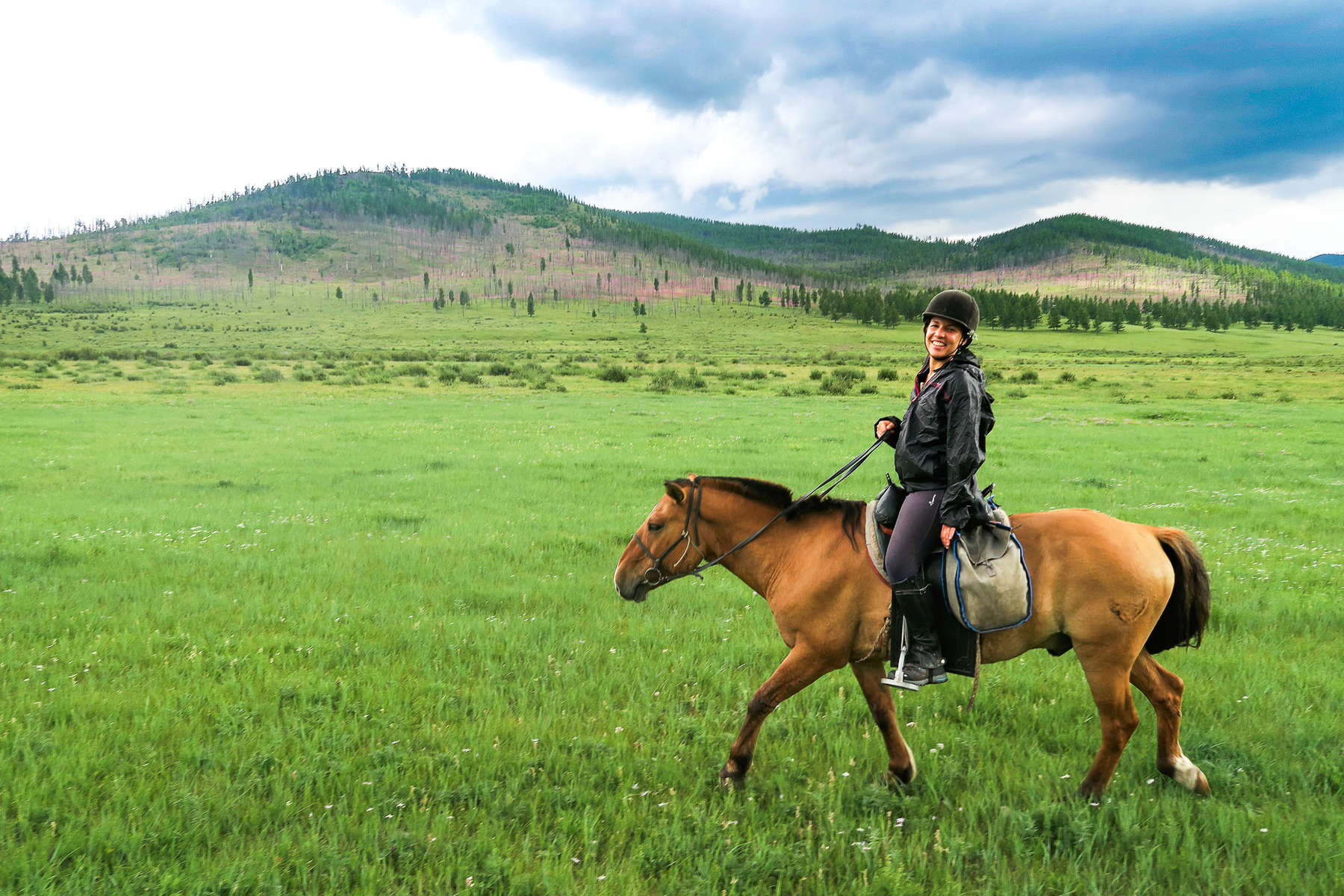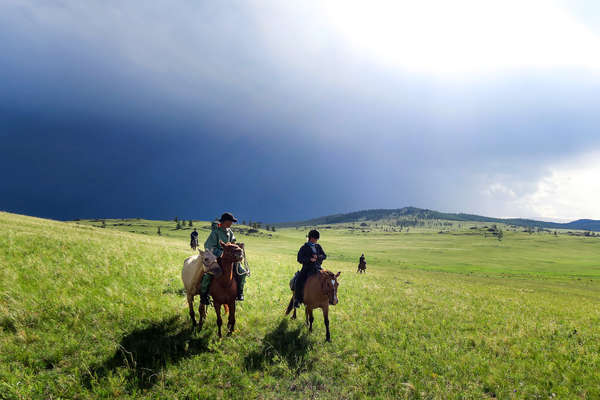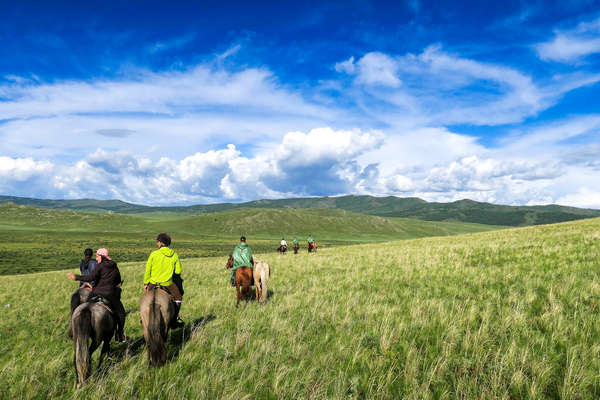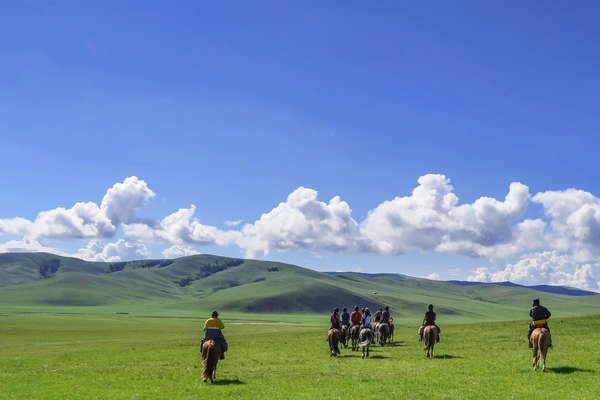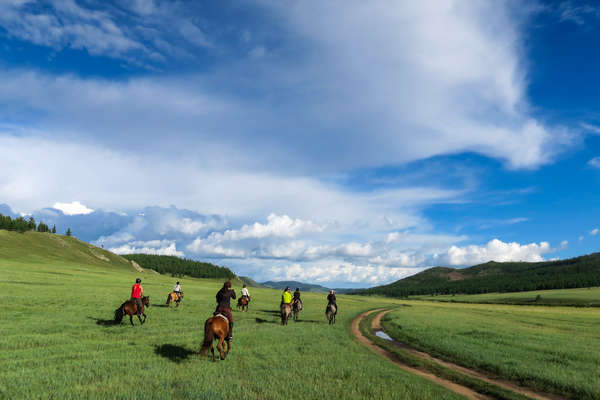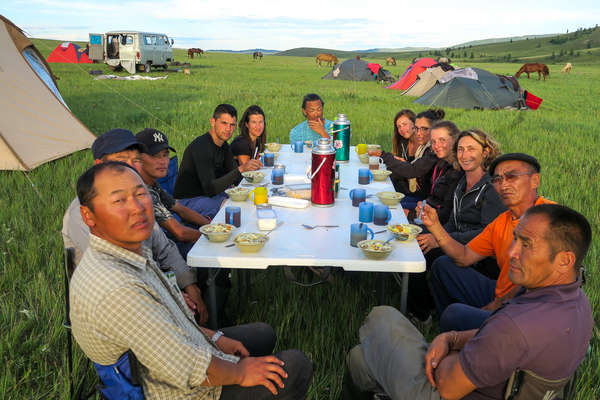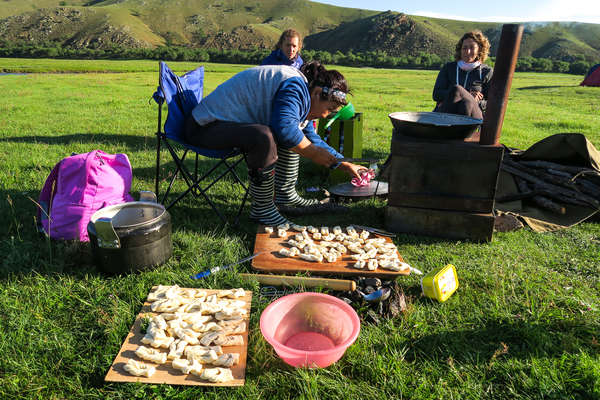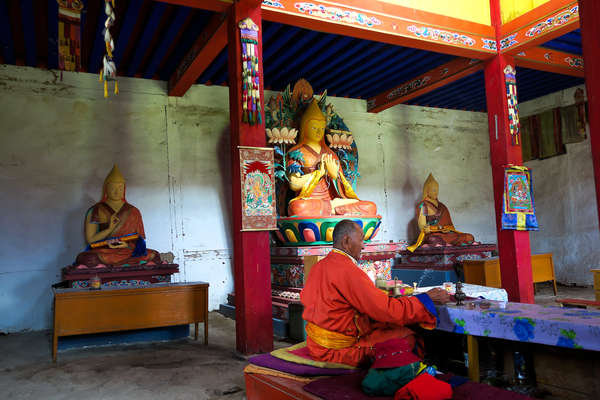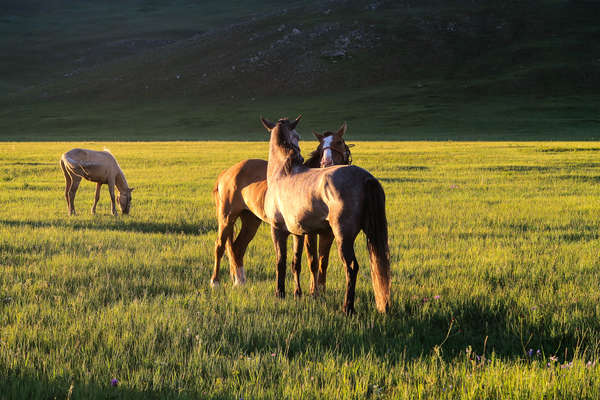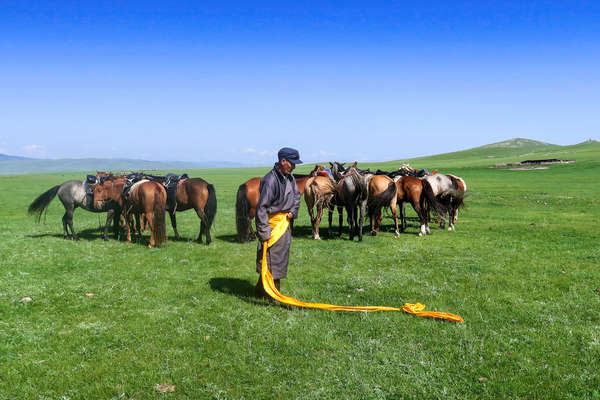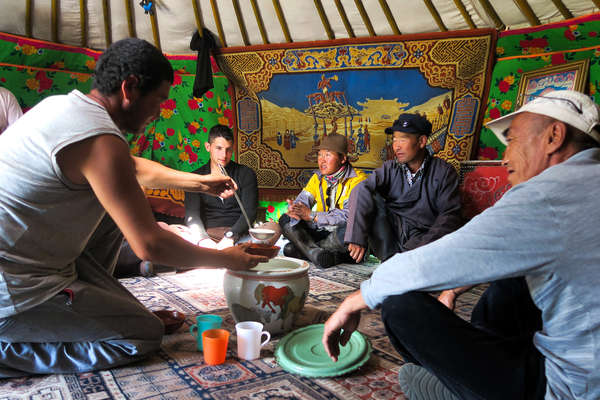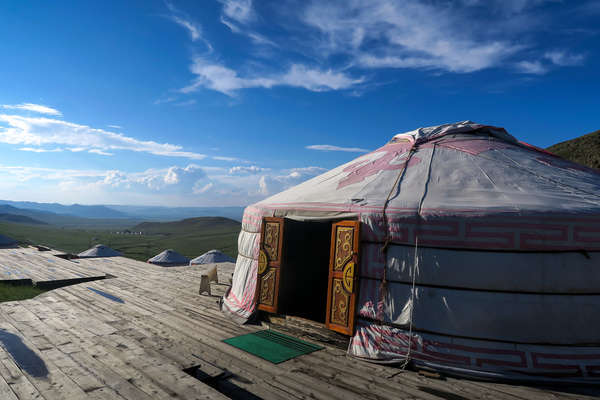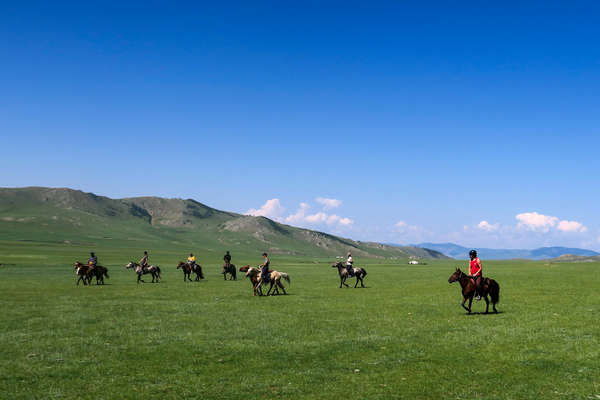Comfort
Whilst on the ride you camp in two-man tents. Mattresses are provided but you need to take your own sleeping bag.
In Ulaanbaatar (first and last night) you stay in a nearby yurt camp which offers comfortable and authentic accommodation.
Meals
The food is simple, abundant and based on fresh products prepared by a local cook and adapted to western tastes. Meals are served on small camping tables with stools, except for some picnic lunches.
Breakfast is usually hearty.
Lunch is often hot when meeting the logistics truck, but sometimes a picnic.
Dinner is a full hot meal (soup, main course, dessert) and may well include lamb/mutton purchased from local nomads.
Water:
Do not to drink water from unknown sources. The cook will boil water each day for you to fill up your water bottles but you should also bring water-purification tablets such as Micropur.
Climate
Mongolia has over 260 days of sunshine a year! Generally there is very little rain - the annual average in the north is 200-350mm and this decreases in the south. Mongolia is located in the heart of a high pressure system which leads to clear skies and Mongolia is sometimes known as the "Land of Blue Skies".
Winters are long and cold (October - April) and so rides run during the summers months of May - September. There is a short rainy season during mid-July - September but rainfall is usually short and scanty in the late afternoon. Temperatures are mild in the north and hotter in the south. Because of the altitude, nights can be cold even in summer.
Winds can be strong, particularly in spring and autumn and the weather can change quickly, so take layers and be prepared!
Tips
If you are happy with the service you receive from your local guides and driver then you may wish to leave a tip. In order to remain consistent with their standard of living, we would recommend something in the region of £40 - £50.
Packing list
When packing please remember that the region can be cold and it would be wise to bring layers!
Head
- Equus Journeys strongly recommend that you wear a riding helmet and that you take your own to ensure a correct fit. There are many lightweight options available nowadays
- Sunhat for when not riding
- Sunglasses - with a cord attached so they don't fly off when riding
- Buff or bandana
- Warm hat for cold nights when camping
Upper body
- Thermals (long or short sleeved)
- Long sleeved shirts provide protection from the sun and are an extra layer
- T-shirts
- Lightweight fleece or jumper
- Warm fleece or jumper (and a spare in case one gets wet)
- Warm and waterproof jacket - it can rain at any time of year and the evenings can be particularly cold
Legs
- Lightweight, comfortable riding trousers or jodhpurs - we recommend riding in them at home before taking them on holiday to ensure they don't rub
- Thermals
- Casual trousers for the evenings, such as jeans or tracksuit bottoms
- Waterproof over trousers
Hands and Feet
- Comfortable riding boots. We recommend short boots with half chaps but you may wish to take long chaps as an extra layer against inclement weather. We don't recommend taking your favourite long leather boots in case they get damaged
- Waterproof shoes/boots can be useful for abundant dew in the mornings or when it rains
- Trainers or equivalent light shoes for moving around the camp in the evenings
- Several pairs of warm, thick socks
- Gloves - your hands are particularly exposed to the sun, cold or rain whilst riding. Waterproof gloves can be particularly useful
Nightwear
- Sleeping bag. You need at least a comfort factor down to minus 5 celsius, but would recommend at least minus 8 or 10 celsius.
- Sleeping bag liner - silk, cotton or fleece - adds an extra layer
- Pyjamas or tracksuits or thermals for sleeping in
Other useful items
- Water-purification tablets
- Swimsuit - for swimming/bathing in rivers
- Towels - camping ones will both dry and pack more easily
- Small backpack for accessing items required during the day (carried by support crew)
- Camera and high capacity memory card. Spare battery
- Bumbag for carrying your camera and small items whilst riding
- Headtorch or small torch for moving around camp at night - bring spare batteries and bulbs
- Water bottle (2 litres or 2 x 1 litre)
- Wet Wipes or equivalent (for when washing facilities aren't available)
- Toilet paper and a lighter to burn it with
- Small plastic bags for rubbish
- Ear plugs (for light sleepers)
- Micropur tablets
In your hold luggage
- Any liquids, such as shampoo, moisturiser, deodorant unless they are less than 100ml and all bottles can fit in a small, clear, plastic ziplock bag. We recommend biodegradable washing products where possible.
- Swiss army knife (or equivalent)
In your hand luggage
- Any valuables, such as your camera, ipod, ipad etc.
- Your riding hat
Medical kit
- Sunscreen and lip balm - should be high factor
- Insect repellent, preferably containing deet
- Any medication you regularly take
- Blister plasters in case of any rubs
- Antiseptic cream, plasters, aspirin, anti-histamine, insect-bite salve etc...
- Spare prescription glasses/contact lenses
- Eye drops
- Imodium or similar anti-diarrhoea medication
- Re-hydration sachets
- Water purification tablets
- Antiseptic wipes
- Handwash gel
Our Recommendations
- Please don't take a hard sided suitcase. Your luggage should be soft sided with a capacity of 60-80 litres. We recommend taking a backpack or similar. The luggage limit on the ride is 15kg per person.
- Backpacks cannot be worn whilst riding. We recommend a small bumbag or a coat with pockets so that you can carry small items with you during the day (camera, sunscreen, lipbalm etc)
- We recommend travelling in your riding boots and carrying your hat and some riding clothes in your hand luggage - then if your luggage goes astray you are still able to ride!
- Tall riders may benefit from taking a pair of long stirrup leathers with them (the local stirrups are adjustable but are sometimes limited in length)
- We recommend taking a copy of your passport and insurance documents with you in case you lose your originals
- Please take your rubbish home with you. There are no recycling facilities in Mongolia, so take your used batteries, aerosols etc back home and dispose of them appropriately. Try to leave excess packaging material at home before travelling
- You may wish to take some photographs or postcards of your home with you to show your hosts. You may also wish to take some crayons, colouring books etc for the children

